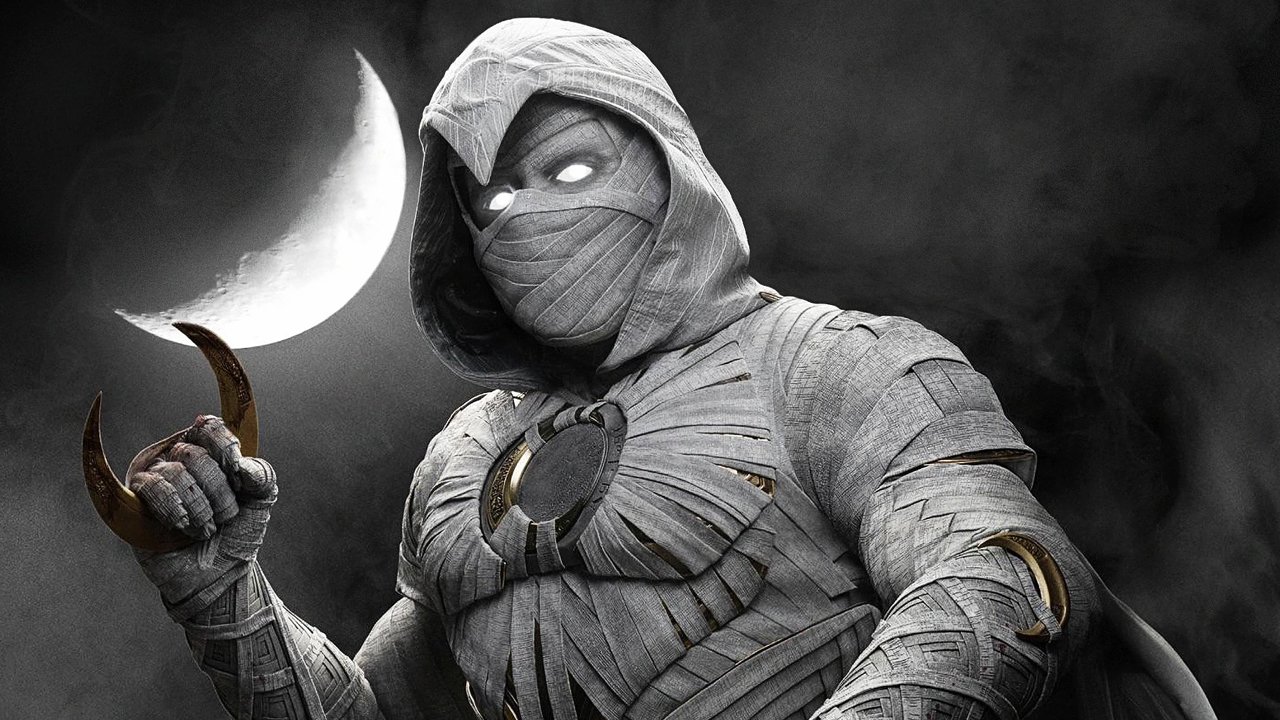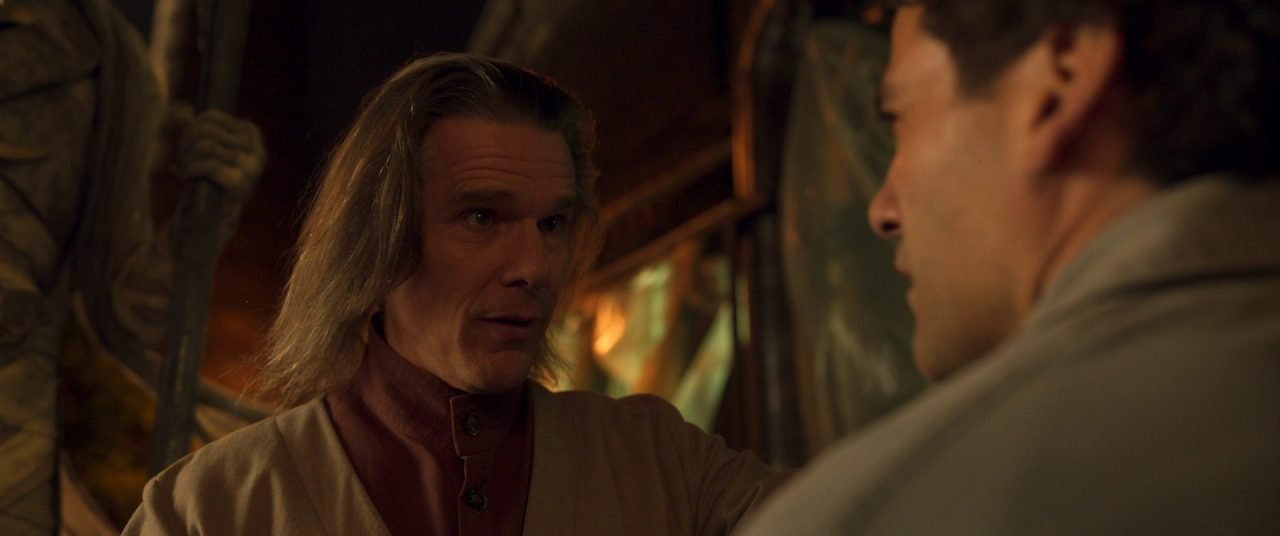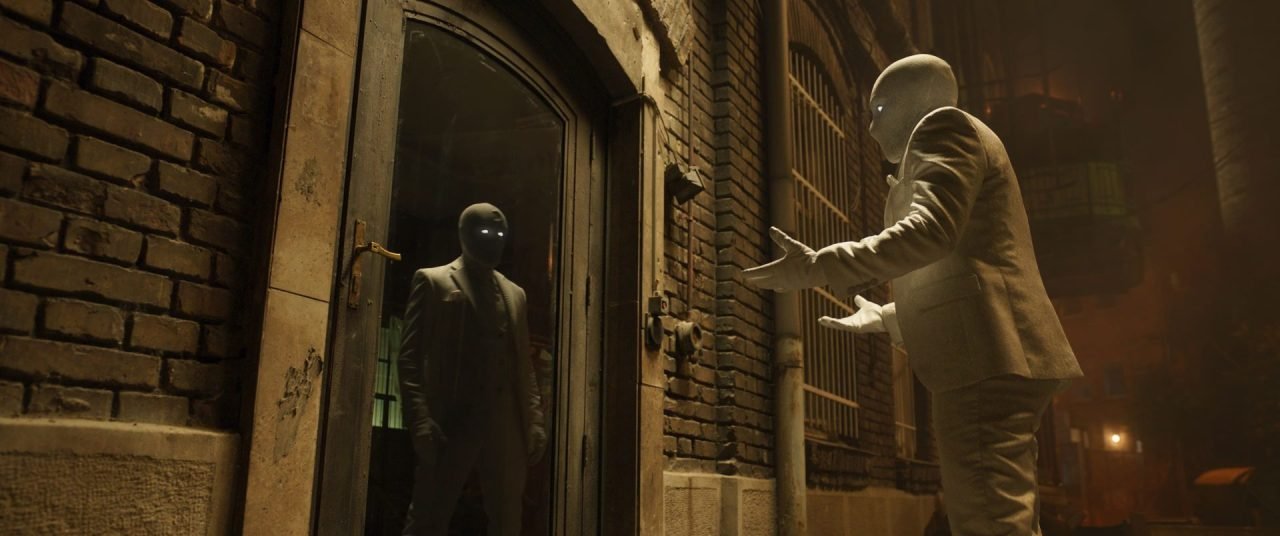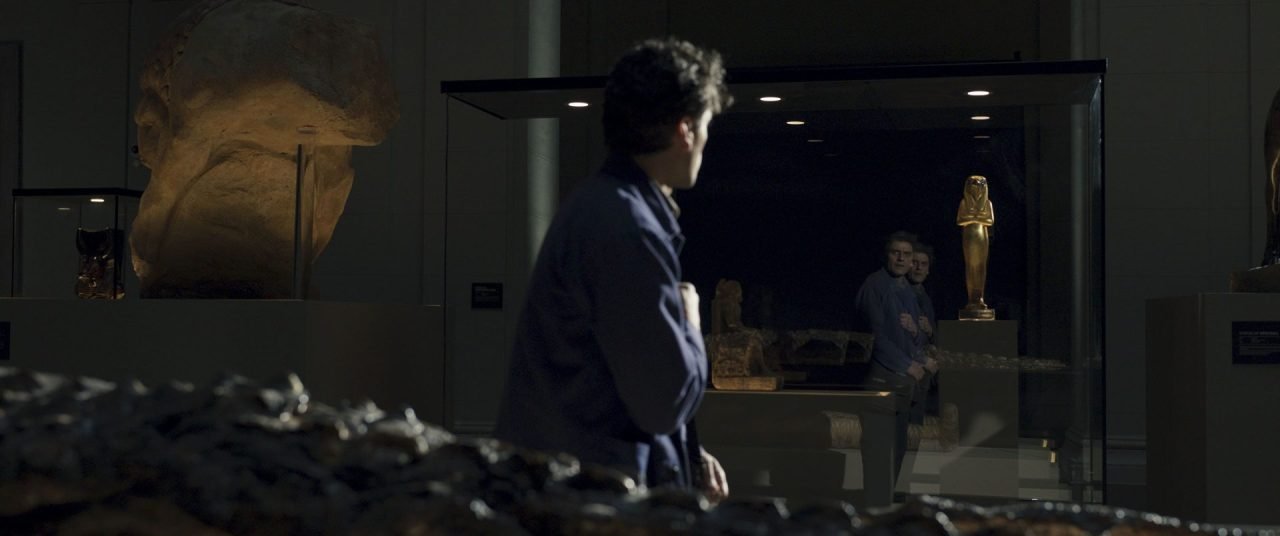
Sometimes it takes people three shoes to get a perfect fit. Except for Oscar Isaac, who confidently steps into each role in full stride. Viewers are over Isaac’s shoulders as he runs along with Marvel’s mind-bending thriller. In the process, Moon Knight is cemented as one of the MCU’s most personal entries yet.
Each episode feels carefully crafted with Isaac in mind (no pun intended). It’s daunting enough for the Star Wars, Ex Machina and Dune actor to bring a long-overdue hero to life. Moon Knight’s jump from a pulp-horror comic in 1975 (Werewolf By Night, Issue 32) comes at a refreshing era for Marvel’s serialized foray. Just as the MCU breaks into longer form storytelling, it’s a perfect time to let Moon Knight take his first breath. The limited series boldly entertains by taking every advantage of Isaac’s three-in-one role.
Ironically, Moon Knight’s identity speaks for itself. Isaac plays Steven Grant, Marc Spector and the titular hero simultaneously. He sticks out like a three-headed Cerberus at a PetSmart. Marvel rightly takes the TV approach to Moon Knight and gives viewers more than enough time to understand each character. An unwinding journey based on Egyptian mythology takes viewers beyond the familiar New York City. While the series sticks close to the comics by staying away from the MCU. Eventually, Moon Knight starts to open up and pull Marvel fans close. New and veteran MCU-goers won’t be able to let Isaac’s Moon Knight go, now cemented as a new favourite caped hero.

Without spoilers, Moon Knight benefits greatly by sticking to Isaac. He becomes the focus of sharing multiple personalities. In turn, the show rarely veers off from strong development of three personas. Steven Grant is one of the nicest MCU characters viewers will ever meet. He’s shy, but breaking past it one icebreaker and dad joke at a time. The museum gift-shop worker is constantly marginalized by his overlord manager, since he’s nice to a fault. Isaac draws a fine line with Steven through an earnest British accent. In fact, sharp character development across Episode One will make viewers sympathetic.
Moon Knight doubles-down on star power by pulling a regular bloke out of his quiet life. The reluctant hero trope inevitably hits. But the show does this slightly better by framing Steven’s sudden dissociative identity disorder as a driver. Quite literally, viewers are thrown into Marc Spector’s violent seconds as a mercenary. It’s not as terrifying, until Steven finds himself standing from one murder scene to the next. But Marvel gives audiences every essential clue on-the-go without moving too fast.
Instead, viewers flash-forward to a unique take on the superhero origin story. This pacing is masterfully controlled by smart writing and direction by Mohamed Diab in the first episode. An early chase sequence is cleverly cut through sudden jumps. While Marvel’s presentation of results from both Steven Grant and Marc Spector in surprising ways.

No Marvel Studios work is safe from comic relief. Moon Knight gives Wandavision and Loki some competition for black comedy. The latest series plays with its two main personas gleefully. Some moments hilariously put Grant’s confusion in the face of danger. Others bits see Spector helplessly tortured by Grant’s happy-go-lucky charms.
“Moon Knight gives Wandavision and Loki some competition for black comedy”
The show’s seemingly convoluted “jumps” won’t be too hard to keep up with. In fact, it’s exciting to see Steven adjust back to his London life. Moon Knight pulls the rug by instantaneously jumping to Spector, who pushes the story and action along. I won’t doubt Isaac’s ability to embody Grant and Spector in different scenes. But my jaw continued to drop when both personalities finished each other’s thoughts. These scenes are a real delight for viewers gazing into unpredictability throughout Moon Knight.
As you’ve probably noticed by now, I haven’t mentioned a third persona: Moon Knight himself. The series confirms many deviations from its bigger universe. Its plot barely packs an Easter egg to remind viewers of the MCU. In fact, viewers might appreciate just how standalone Moon Knight is while it’s carried by two seemingly regular characters. That’s because the story always keeps viewers close to Grant/Spector. Viewers are just as confused as our mild-mannered retail employees so much that Grant struggles to pick up after Spector’s messes. I’ll leave it to viewers to decipher much of Moon Knight’s Egyptian roots, closely knitted with Mohamed Diab’s direction to detail.
banner brigade set fortnite

Here’s where Marc Spector, grizzled all-American mercenary and level-headed explorer, is used to up the ante. Grant fights for control of his body in a no-nonsense dynamic. A solid, suspenseful tone keeps this relationship between Grant and Spector hostile. It’s incredibly fun to see a balance of brains versus braun in the most Marvel way possible (sorry, Hulk). Moon Knight’s superhero persona is the lesser part of that equation. But it’s thrilling to see the bandage-clad badass clear computer screens of evildoers. The fight scenes come with a larger-than-life spectacle. Particularly when Moon Knight challenges its cast with equally supernatural foes. Moon Knight’s abilities are a treat to see when those rare scenes come. Oh, Mr. Knight is a real show stealer.
But the mythology adds a compelling and supernatural element to Moon Knight. Without Hulk’s science, Cap’s R&D physiology or Iron Man’s believable advancements, Moon Knight finds power in fantasy. By Episode Four, the show starts to step away from its strong first impression. A gap between each persona starts closing. As such, Moon Knight has to make up for less mystery with adventure. Viewers will get to dive into the hero’s power, even if it leaves some unique psychological horror behind. The tonal shift might set the bar lower after raising it so early on. Viewers might miss Moon Knight’s psychological thrills as adventure sets in.
Pacing is Moon Knight’s real asset. Six episodes let each setting, set piece and sequence flow easily. The aforementioned “jumps” cleverly connect a London museum to a car chase. To preserve Moon Knight’s rating, the bloodiest details are skipped over through Grant/Spector.

The “superhero” persona is used somewhat sparingly. Marvel delivers when Isaac transforms into the caped sentry. But viewers won’t need to count on those moments from being so enamoured with Grant/Spector.
Surprisingly, Moon Knight scales back its main cast into a handful of characters. Marvel sticks to stronger leads than an overloading of adapted comic book names. I had plenty of fun watching the supporting characters keep up with Grant/Spector over time.
“It’s refreshing to see a smaller Marvel Comics villain like Arthur Harrow (Ethan Hawke) share in the moonlight (pun intended).”
It’s refreshing to see a smaller Marvel Comics villain like Arthur Harrow (Ethan Hawke) share in the moonlight (pun intended). Hawke evokes a bit of Shang-Chi’s Tony Leung with an unimposing demeanour. His unique power sees the best and worst out of people. This adds a compelling twist across the series, as the supervillain is confused by the superhero. Moon Knight effectively draws viewers into Hawke’s charismatic caricature. Then surprises viewers by showing off his more unsettling qualities. Harrow’s role as a cult leader adds to the show’s menacing cast – even if he’s not that powerful.

Harrow’s own goals start to align with Grant/Spector through said Egyptian influences. The biggest element involves Khonshu, a deity shaped by ancient mythology. Marvel frames Khonshu as a jaded figure – straight from Moon Knight’s modern comics in Earth-616. F. Murray Abraham’s commanding voice easily grabs Grant/Spector’s attention in every scene. His passive-aggressive roasts against Grant are justified with a sense of urgency. Khonshu’s banter with Spector is typical of two like-minded justice seekers. Grant/Spector/Knight are connected to Harrow through Khonshu. I steer clear of spoilers on how. But it’s refreshing to see a Marvel supervillain attempt to manipulate three different personalities at once across Moon Knight’s season.
Moon Knight finds companionship in Layla El-Faouly (played by May Calamawy). The fellow adventurer is just as puzzled as viewers about meeting Steven Grant instead of Marc Spector. It’s a flipped dynamic which injects mystery into Moon Knight. Without giving the show’s big twist away, Layla does feel like a welcome addition into the MCU. She carries Moon Knight’s story forward with a few goals of her own. Four episodes in, Layla’s motives aren’t fully shaped. But I trust Moon Knight’s last two chapters will bring out Calamawy’s character with stakes. She shares a special chemistry with Isaac, especially as he struggles to keep the three personas exclusive. Moon Knight uses Spector’s past with Layla for some much-needed development. While Steven’s time with Layla can take viewers into Indiana Jones territory once she jumps into the screen.

Moon Knight is long overdue for a live-action debut. Oscar’s experience cuts out three distinctive personas for him to shift between brilliantly. But it’s satisfying to see Marvel Studios introduce him with a winning formula post-Endgame. The extended TV time fully fleshes out Isaac’s deep commitment to three distinctive personalities. Viewers quickly get sucked into a tonally-inconsistent offering. That’s the intended effect Moon Knight adds to keep things exciting. Marvel mostly understands how to tuck superheroes into the world of psychological thrillers.
The show holds back considerably on authenticity in order to remind viewers that Moon Knight is a superhero by nature. Still, the show evenly balances mystery, action and suspense to even deviate from that superhero genre at times. Its cast and crew take a calculated approach to Grant/Spector/Knight’s identities. Viewers are well-rewarded with a twist every few minutes. With Moon Knight fully caught up in a new era of heroes, I’m excited to see where the trio head next.